He fight against corruption in Viet Nam: The role of online press
Abstract: Corruption could derail sustainable development of any country, and Vietnam is no
exception. Vietnamese government had been taking a variety of anti-corruption policies to tackle
corruption issues, of which empowering the role of online press has made notable progress in the
last few years. This paper briefly reviewed the legal framework on corruption prevention and
examined how online press takes part in curbing corruption and its influence on the fight against
corruption in Vietnam. The results show that the online press played a significant role in curbing
corruption by being a powerful tool for propaganda as well as an active channel to report about
corruption in Vietnam, especially from 2016 to 2019. However, there are still many challenges to
overcome in order to strengthen the role of online press in fighting corruption in Vietnam.
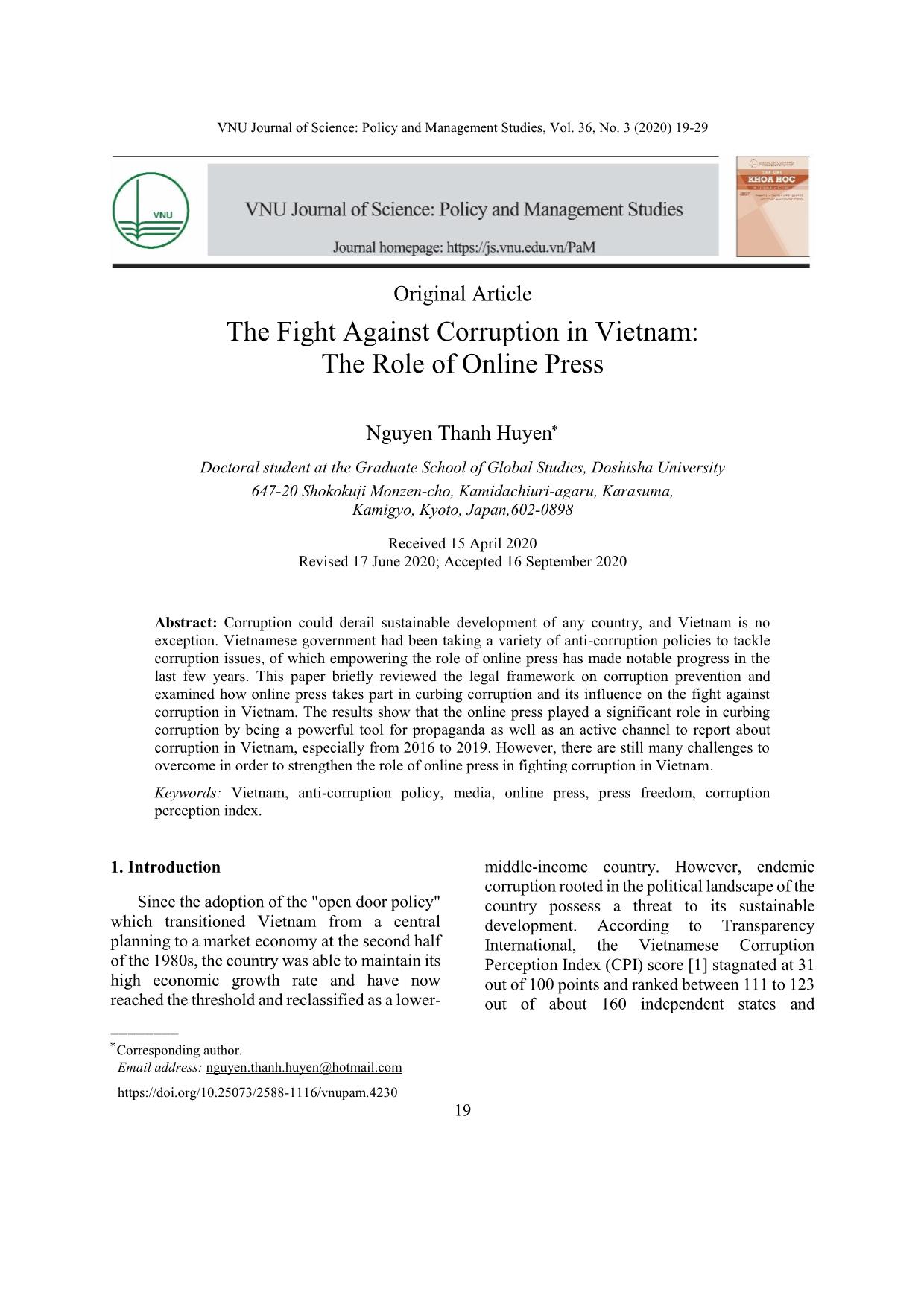
Trang 1
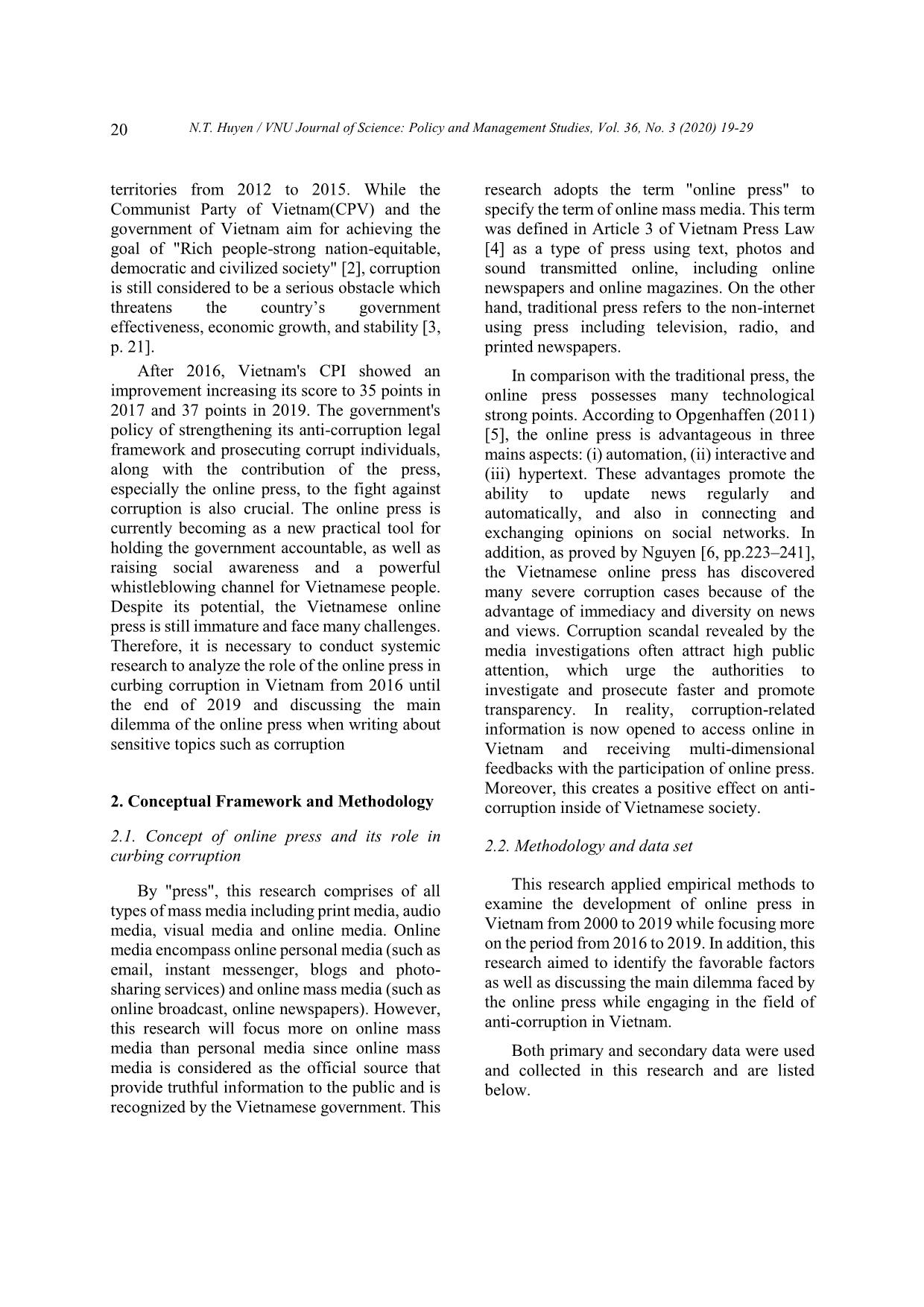
Trang 2
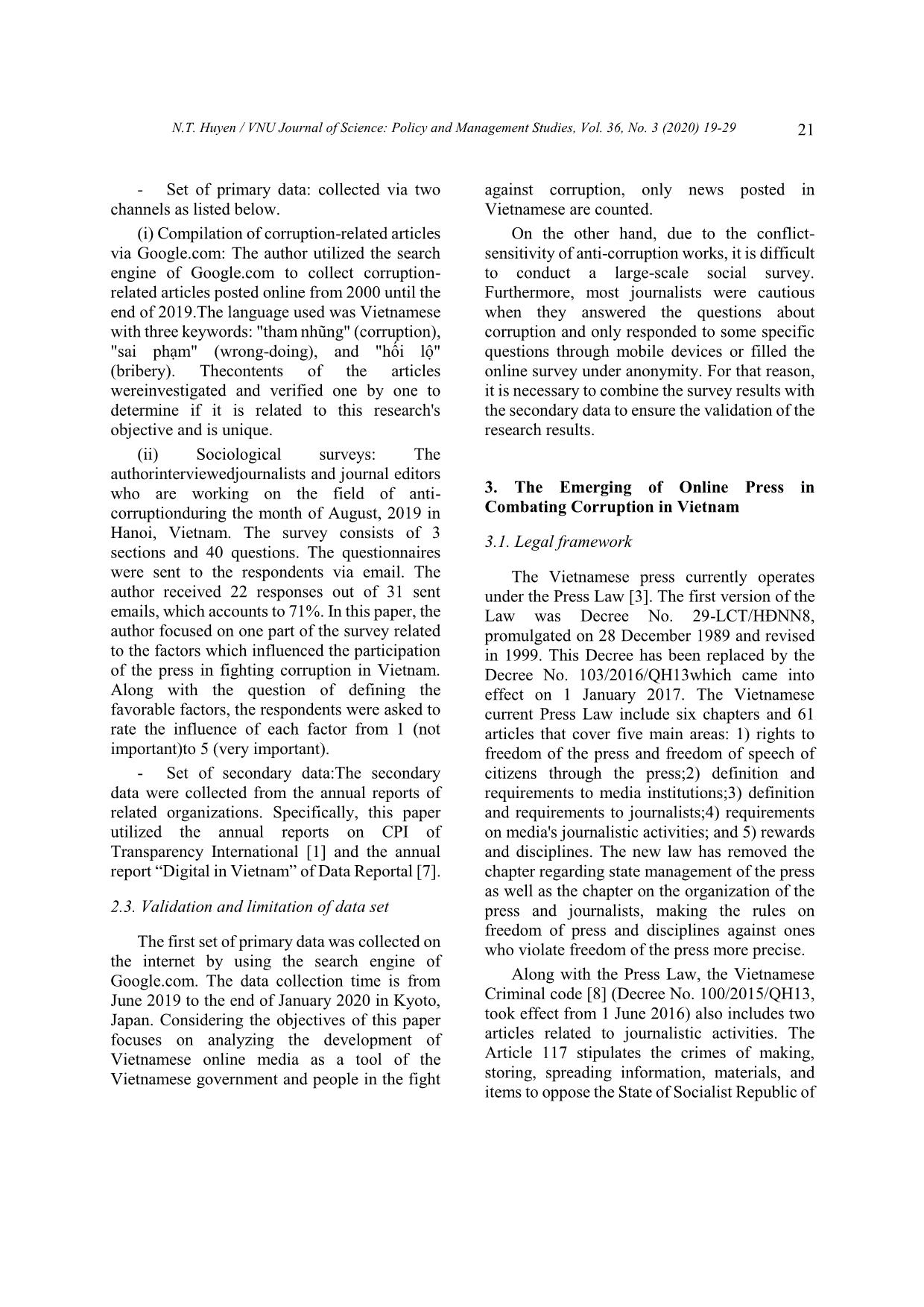
Trang 3
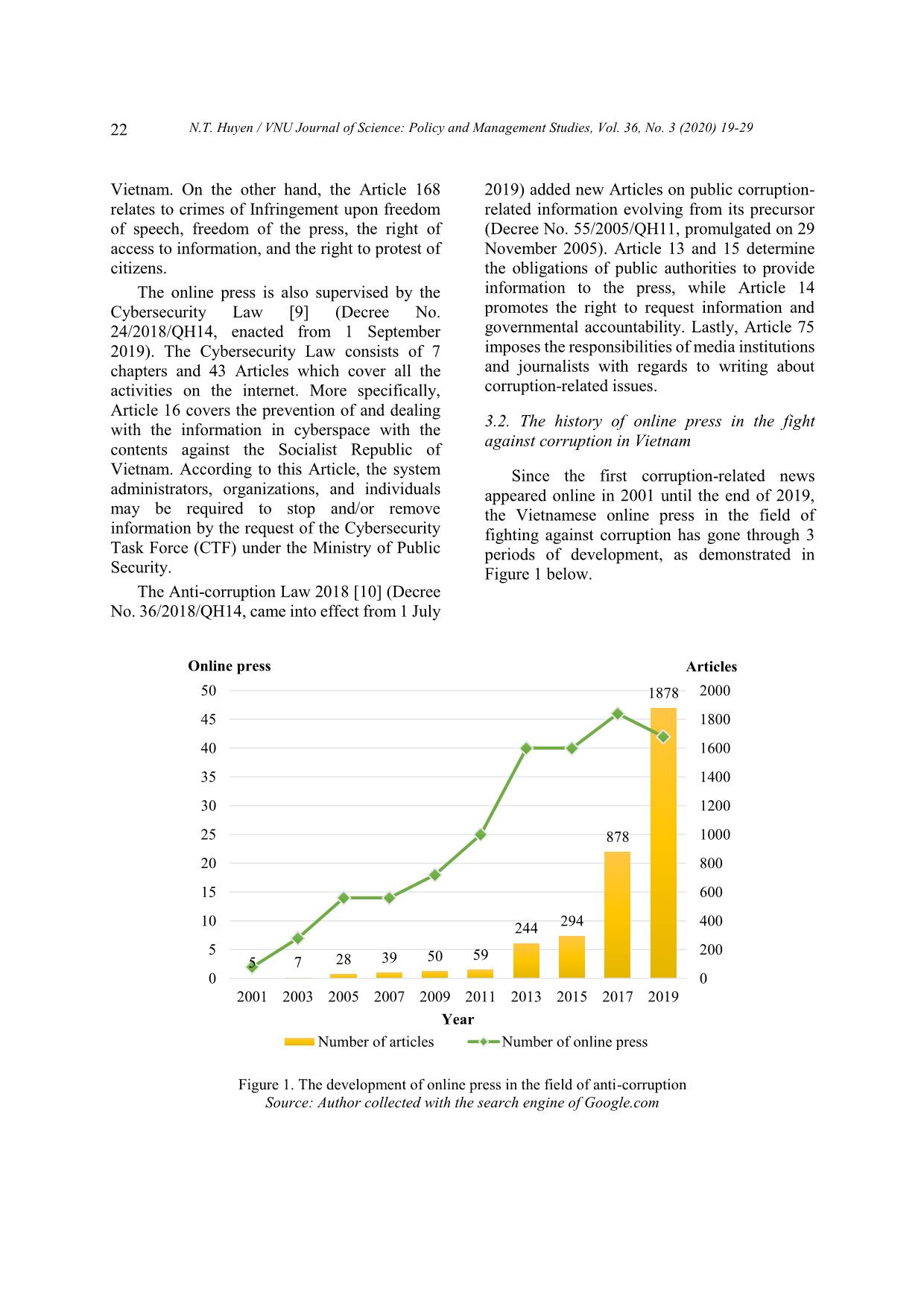
Trang 4
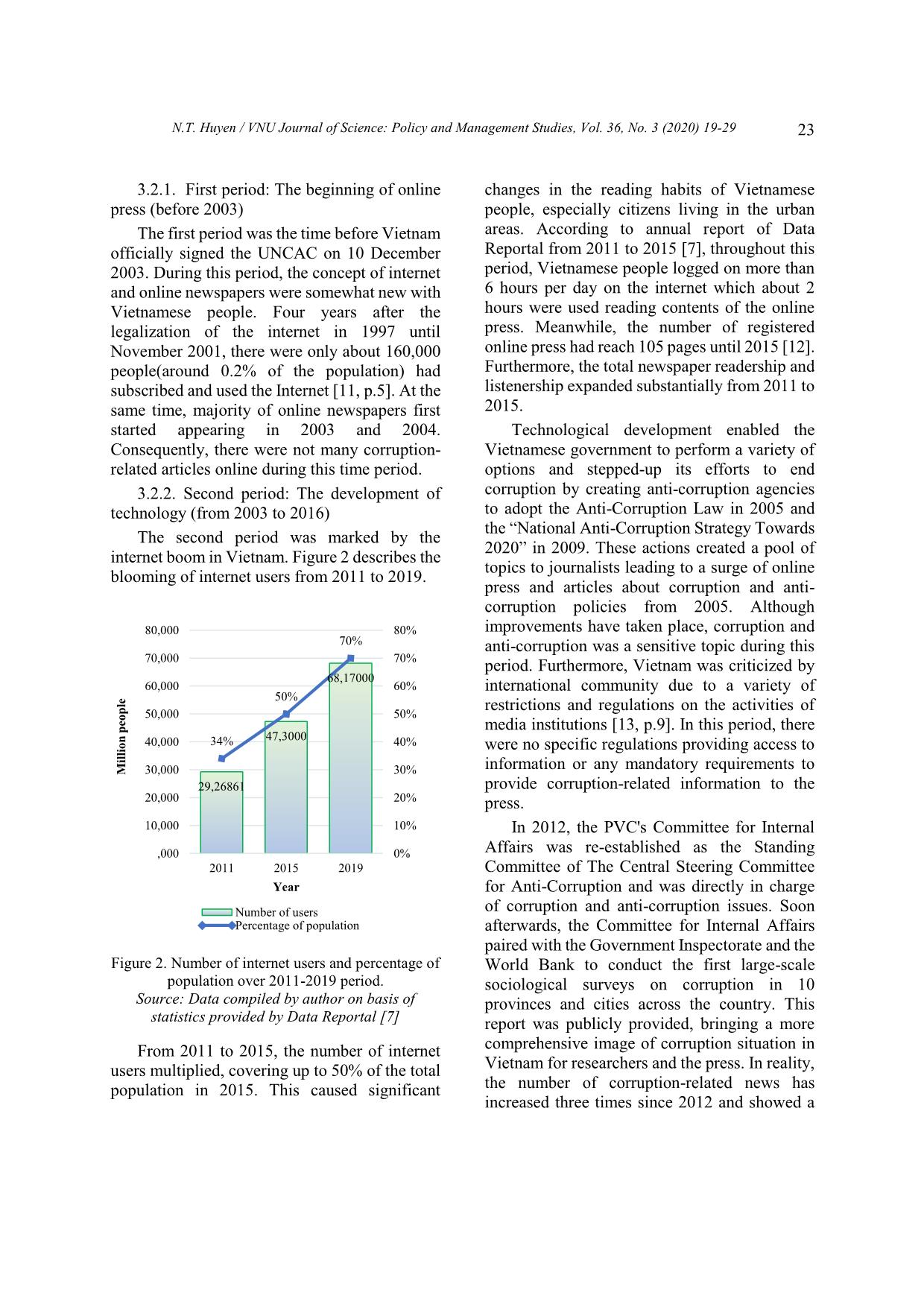
Trang 5
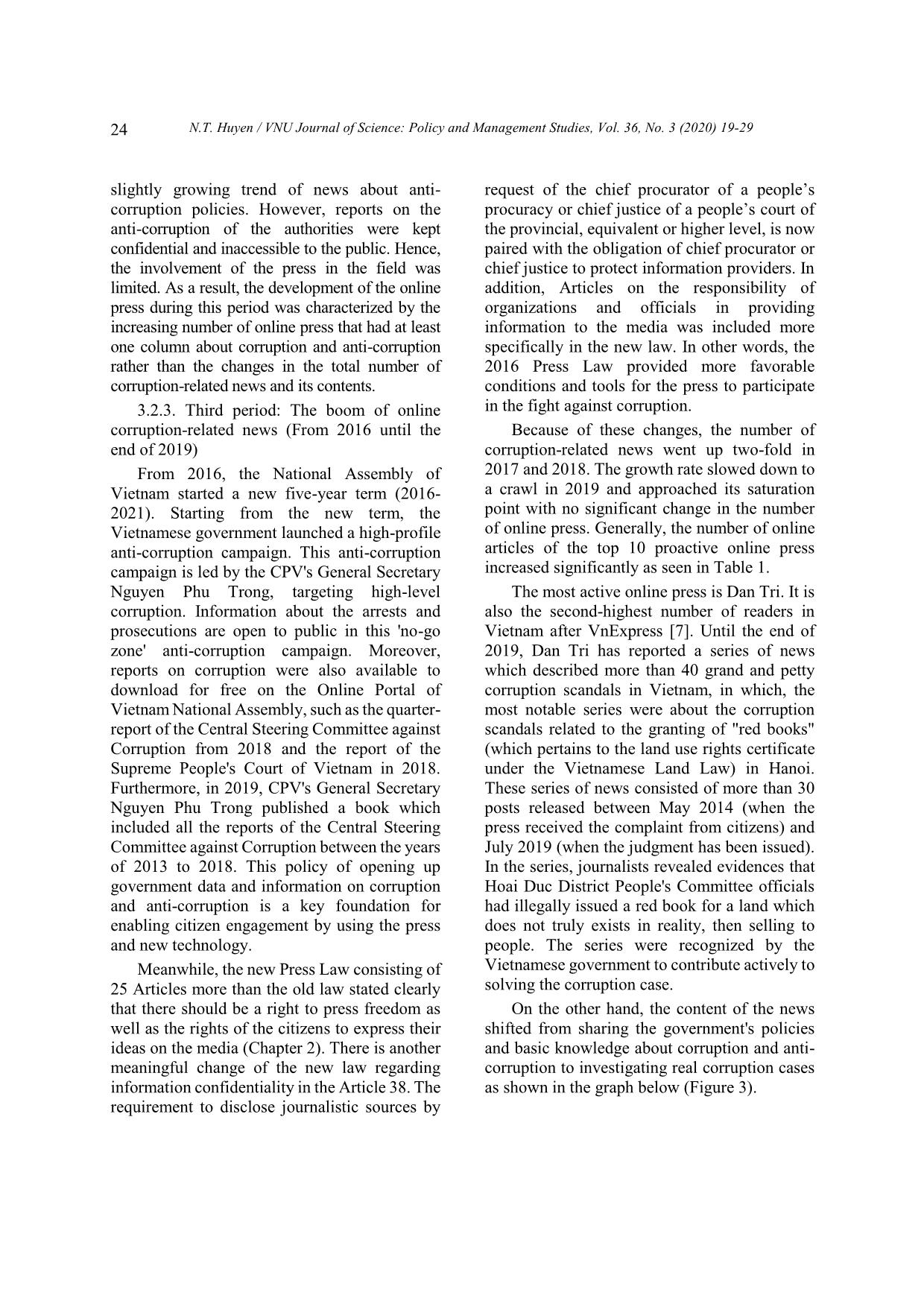
Trang 6
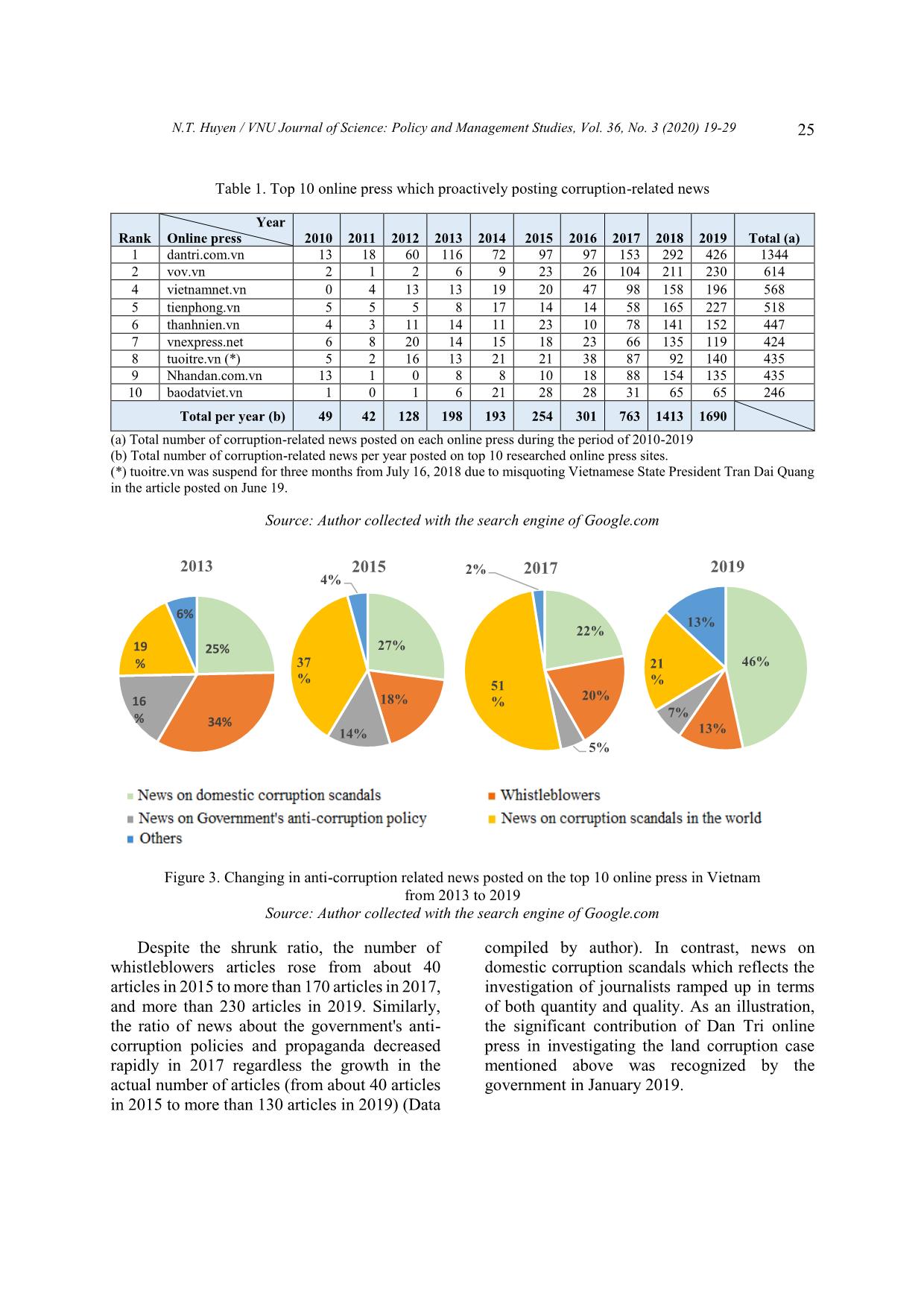
Trang 7
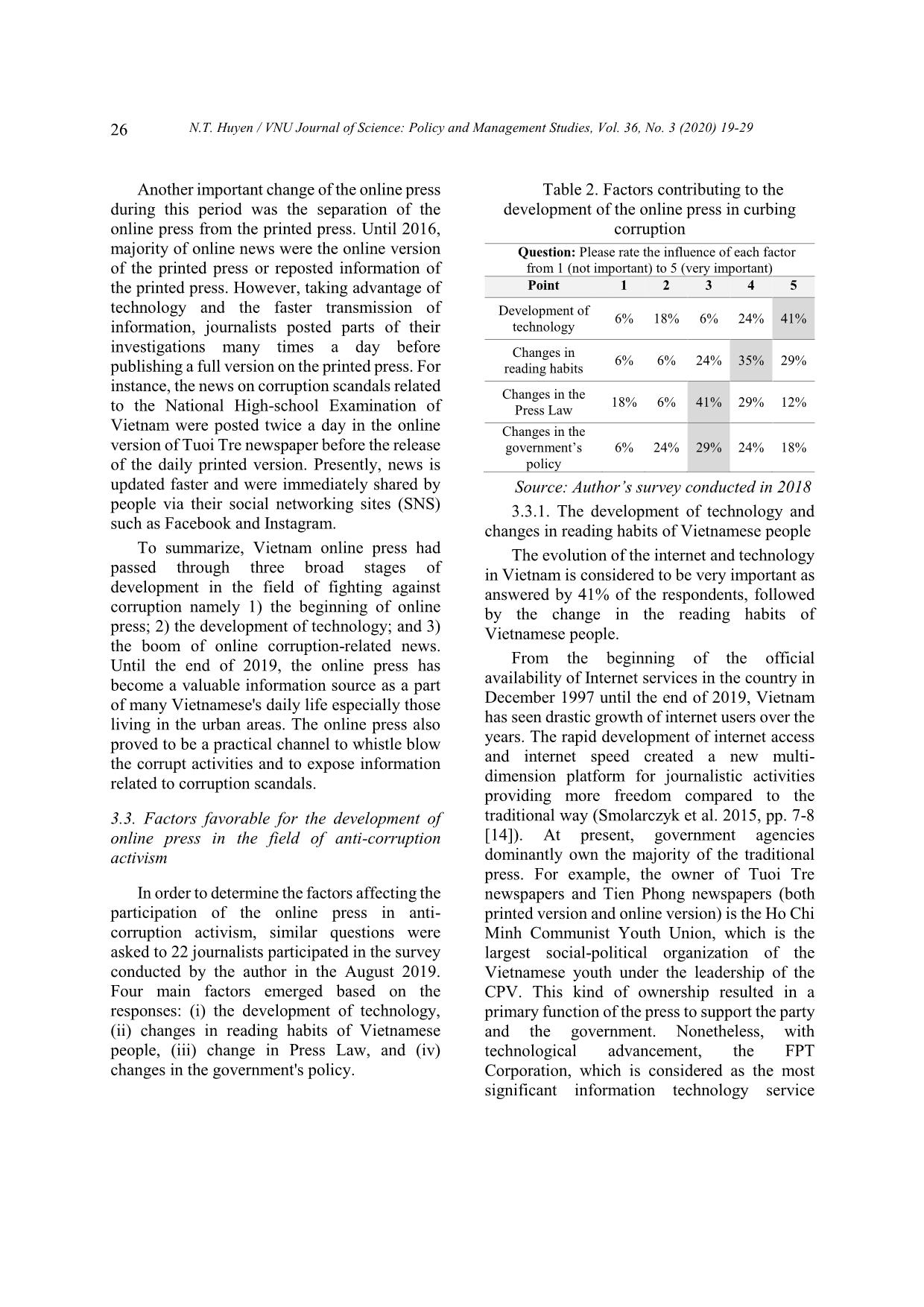
Trang 8
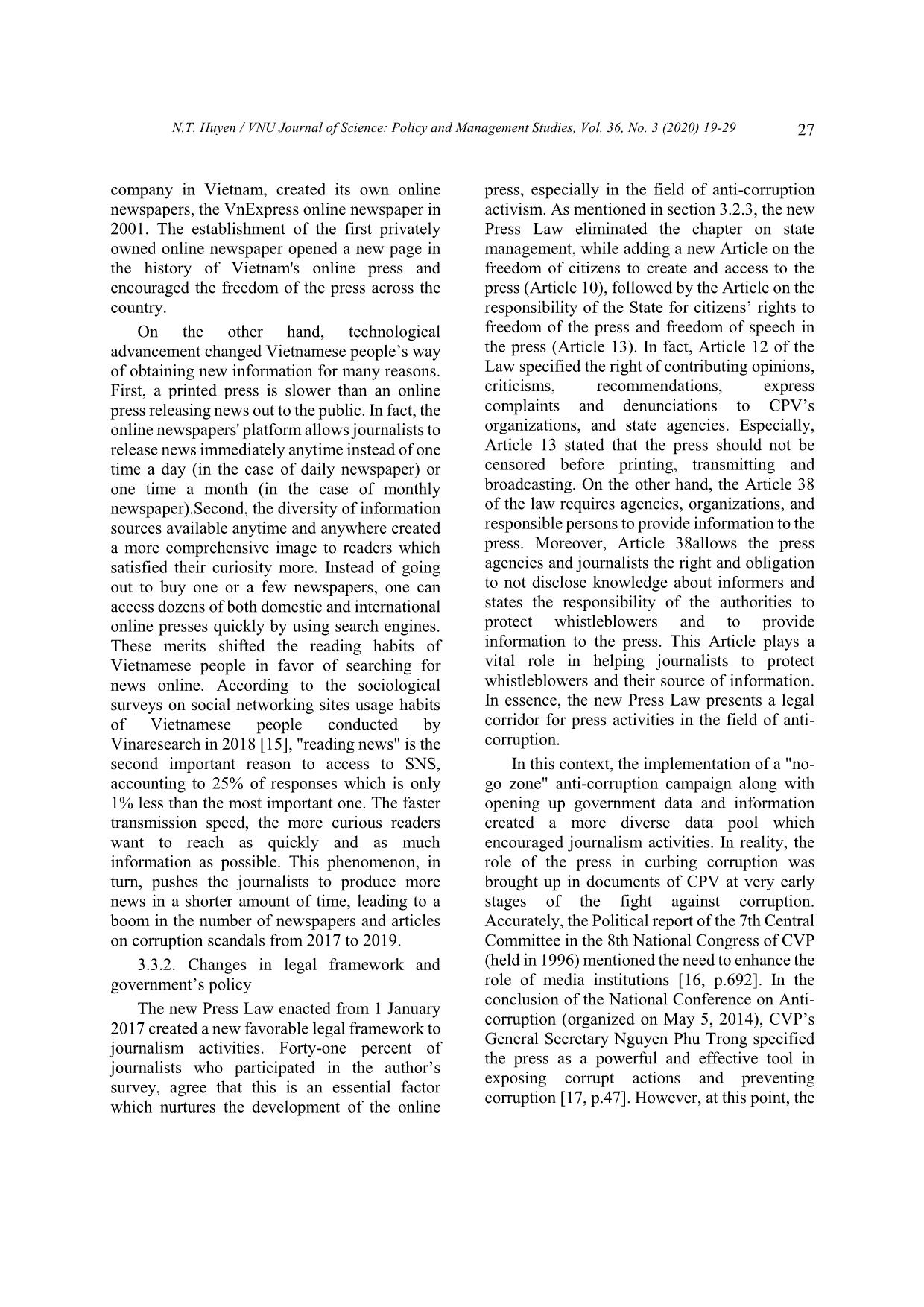
Trang 9
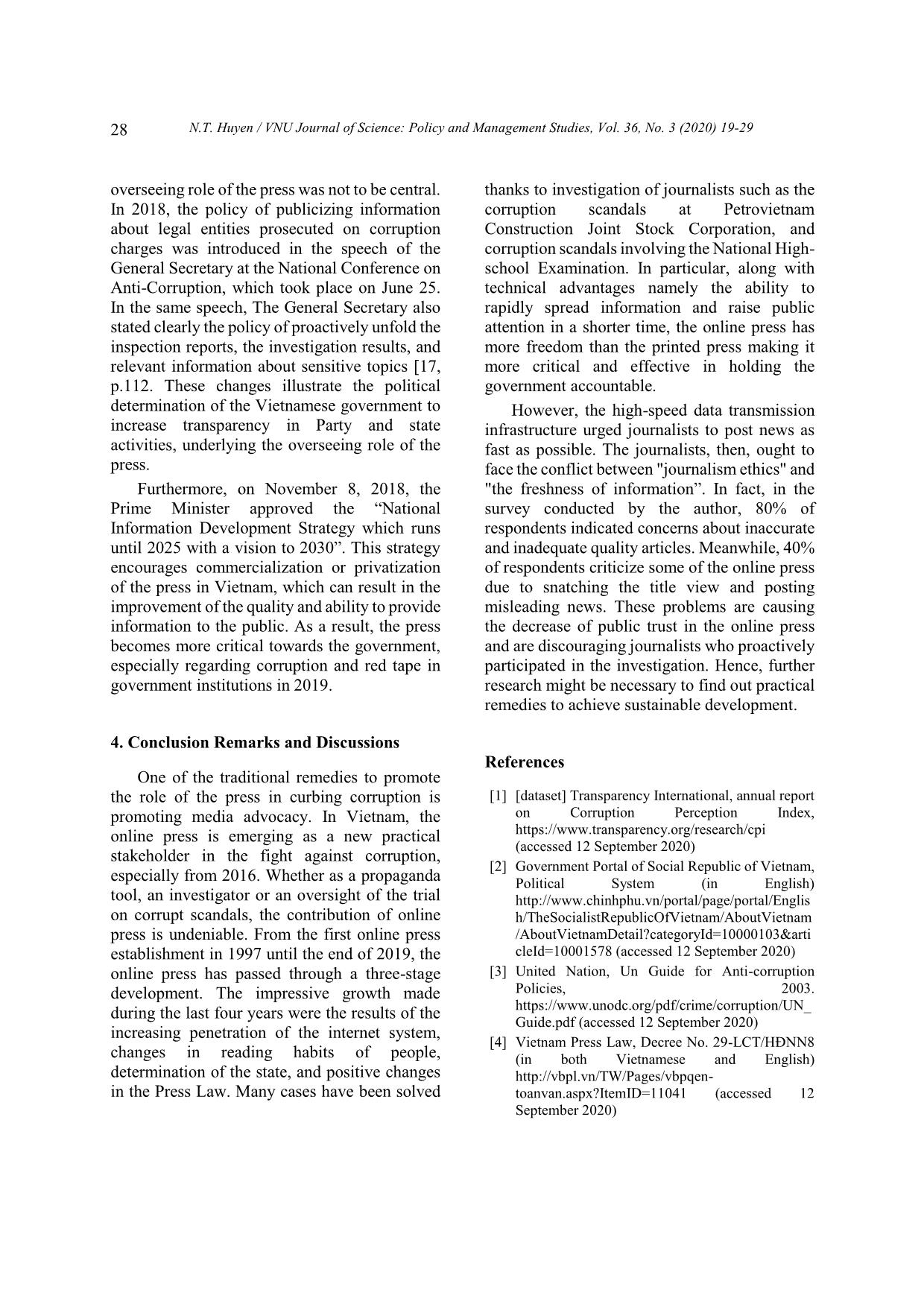
Trang 10
Tải về để xem bản đầy đủ
Tóm tắt nội dung tài liệu: He fight against corruption in Viet Nam: The role of online press
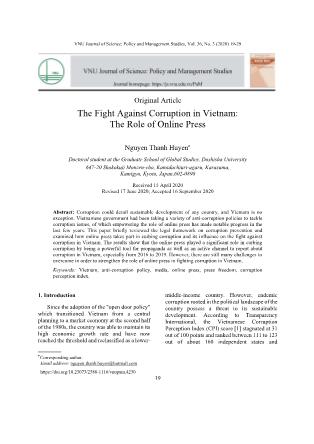
VNU Journal of Science: Policy and Management Studies, Vol. 36, No. 3 (2020) 19-29 19 Original Article The Fight Against Corruption in Vietnam: The Role of Online Press Nguyen Thanh Huyen Doctoral student at the Graduate School of Global Studies, Doshisha University 647-20 Shokokuji Monzen-cho, Kamidachiuri-agaru, Karasuma, Kamigyo, Kyoto, Japan,602-0898 Received 15 April 2020 Revised 17 June 2020; Accepted 16 September 2020 Abstract: Corruption could derail sustainable development of any country, and Vietnam is no exception. Vietnamese government had been taking a variety of anti-corruption policies to tackle corruption issues, of which empowering the role of online press has made notable progress in the last few years. This paper briefly reviewed the legal framework on corruption prevention and examined how online press takes part in curbing corruption and its influence on the fight against corruption in Vietnam. The results show that the online press played a significant role in curbing corruption by being a powerful tool for propaganda as well as an active channel to report about corruption in Vietnam, especially from 2016 to 2019. However, there are still many challenges to overcome in order to strengthen the role of online press in fighting corruption in Vietnam. Keywords: Vietnam, anti-corruption policy, media, online press, press freedom, corruption perception index. 1. Introduction Since the adoption of the "open door policy" which transitioned Vietnam from a central planning to a market economy at the second half of the 1980s, the country was able to maintain its high economic growth rate and have now reached the threshold and reclassified as a lower- ________ Corresponding author. Email address: nguyen.thanh.huyen@hotmail.com https://doi.org/10.25073/2588-1116/vnupam.4230 middle-income country. However, endemic corruption rooted in the political landscape of the country possess a threat to its sustainable development. According to Transparency International, the Vietnamese Corruption Perception Index (CPI) score [1] stagnated at 31 out of 100 points and ranked between 111 to 123 out of about 160 independent states and N.T. Huyen / VNU Journal of Science: Policy and Management Studies, Vol. 36, No. 3 (2020) 19-29 20 territories from 2012 to 2015. While the Communist Party of Vietnam(CPV) and the government of Vietnam aim for achieving the goal of "Rich people-strong nation-equitable, democratic and civilized society" [2], corruption is still considered to be a serious obstacle which threatens the country’s government effectiveness, economic growth, and stability [3, p. 21]. After 2016, Vietnam's CPI showed an improvement increasing its score to 35 points in 2017 and 37 points in 2019. The government's policy of strengthening its anti-corruption legal framework and prosecuting corrupt individuals, along with the contribution of the press, especially the online press, to the fight against corruption is also crucial. The online press is currently becoming as a new practical tool for holding the government accountable, as well as raising social awareness and a powerful whistleblowing channel for Vietnamese people. Despite its potential, the Vietnamese online press is still immature and face many challenges. Therefore, it is necessary to conduct systemic research to analyze the role of the online press in curbing corruption in Vietnam from 2016 until the end of 2019 and discussing the main dilemma of the online press when writing about sensitive topics such as corruption 2. Conceptual Framework and Methodology 2.1. Concept of online press and its role in curbing corruption By "press", this research comprises of all types of mass media including print media, audio media, visual media and online media. Online media encompass online personal media (such as email, instant messenger, blogs and photo- sharing services) and online mass media (such as online broadcast, online newspapers). However, this research will focus more on online mass media than personal media since online mass media is considered as the official source that provide truthful information to the public and is recognized by the Vietnamese government. This research adopts the term "online press" to specify the term of online mass media. This term was defined in Article 3 of Vietnam Press Law [4] as a type of press using text, photos and sound transmitted online, including online newspapers and online magazines. On the other hand, traditional press refers to the non-internet using press including television, radio, and printed newspapers. In comparison with the traditional press, the online press possesses many technological strong points. According to Opgenhaffen (2011) [5], the online press is advantageous in three mains aspects: (i) automatio ... formation of the printed press. However, taking advantage of technology and the faster transmission of information, journalists posted parts of their investigations many times a day before publishing a full version on the printed press. For instance, the news on corruption scandals related to the National High-school Examination of Vietnam were posted twice a day in the online version of Tuoi Tre newspaper before the release of the daily printed version. Presently, news is updated faster and were immediately shared by people via their social networking sites (SNS) such as Facebook and Instagram. To summarize, Vietnam online press had passed through three broad stages of development in the field of fighting against corruption namely 1) the beginning of online press; 2) the development of technology; and 3) the boom of online corruption-related news. Until the end of 2019, the online press has become a valuable information source as a part of many Vietnamese's daily life especially those living in the urban areas. The online press also proved to be a practical channel to whistle blow the corrupt activities and to expose information related to corruption scandals. 3.3. Factors favorable for the development of online press in the field of anti-corruption activism In order to determine the factors affecting the participation of the online press in anti- corruption activism, similar questions were asked to 22 journalists participated in the survey conducted by the author in the August 2019. Four main factors emerged based on the responses: (i) the development of technology, (ii) changes in reading habits of Vietnamese people, (iii) change in Press Law, and (iv) changes in the government's policy. Table 2. Factors contributing to the development of the online press in curbing corruption Question: Please rate the influence of each factor from 1 (not important) to 5 (very important) Point 1 2 3 4 5 Development of technology 6% 18% 6% 24% 41% Changes in reading habits 6% 6% 24% 35% 29% Changes in the Press Law 18% 6% 41% 29% 12% Changes in the government’s policy 6% 24% 29% 24% 18% Source: Author’s survey conducted in 2018 3.3.1. The development of technology and changes in reading habits of Vietnamese people The evolution of the internet and technology in Vietnam is considered to be very important as answered by 41% of the respondents, followed by the change in the reading habits of Vietnamese people. From the beginning of the official availability of Internet services in the country in December 1997 until the end of 2019, Vietnam has seen drastic growth of internet users over the years. The rapid development of internet access and internet speed created a new multi- dimension platform for journalistic activities providing more freedom compared to the traditional way (Smolarczyk et al. 2015, pp. 7-8 [14]). At present, government agencies dominantly own the majority of the traditional press. For example, the owner of Tuoi Tre newspapers and Tien Phong newspapers (both printed version and online version) is the Ho Chi Minh Communist Youth Union, which is the largest social-political organization of the Vietnamese youth under the leadership of the CPV. This kind of ownership resulted in a primary function of the press to support the party and the government. Nonetheless, with technological advancement, the FPT Corporation, which is considered as the most significant information technology service N.T. Huyen / VNU Journal of Science: Policy and Management Studies, Vol. 36, No. 3 (2020) 19-29 27 company in Vietnam, created its own online newspapers, the VnExpress online newspaper in 2001. The establishment of the first privately owned online newspaper opened a new page in the history of Vietnam's online press and encouraged the freedom of the press across the country. On the other hand, technological advancement changed Vietnamese people’s way of obtaining new information for many reasons. First, a printed press is slower than an online press releasing news out to the public. In fact, the online newspapers' platform allows journalists to release news immediately anytime instead of one time a day (in the case of daily newspaper) or one time a month (in the case of monthly newspaper).Second, the diversity of information sources available anytime and anywhere created a more comprehensive image to readers which satisfied their curiosity more. Instead of going out to buy one or a few newspapers, one can access dozens of both domestic and international online presses quickly by using search engines. These merits shifted the reading habits of Vietnamese people in favor of searching for news online. According to the sociological surveys on social networking sites usage habits of Vietnamese people conducted by Vinaresearch in 2018 [15], "reading news" is the second important reason to access to SNS, accounting to 25% of responses which is only 1% less than the most important one. The faster transmission speed, the more curious readers want to reach as quickly and as much information as possible. This phenomenon, in turn, pushes the journalists to produce more news in a shorter amount of time, leading to a boom in the number of newspapers and articles on corruption scandals from 2017 to 2019. 3.3.2. Changes in legal framework and government’s policy The new Press Law enacted from 1 January 2017 created a new favorable legal framework to journalism activities. Forty-one percent of journalists who participated in the author’s survey, agree that this is an essential factor which nurtures the development of the online press, especially in the field of anti-corruption activism. As mentioned in section 3.2.3, the new Press Law eliminated the chapter on state management, while adding a new Article on the freedom of citizens to create and access to the press (Article 10), followed by the Article on the responsibility of the State for citizens’ rights to freedom of the press and freedom of speech in the press (Article 13). In fact, Article 12 of the Law specified the right of contributing opinions, criticisms, recommendations, express complaints and denunciations to CPV’s organizations, and state agencies. Especially, Article 13 stated that the press should not be censored before printing, transmitting and broadcasting. On the other hand, the Article 38 of the law requires agencies, organizations, and responsible persons to provide information to the press. Moreover, Article 38allows the press agencies and journalists the right and obligation to not disclose knowledge about informers and states the responsibility of the authorities to protect whistleblowers and to provide information to the press. This Article plays a vital role in helping journalists to protect whistleblowers and their source of information. In essence, the new Press Law presents a legal corridor for press activities in the field of anti- corruption. In this context, the implementation of a "no- go zone" anti-corruption campaign along with opening up government data and information created a more diverse data pool which encouraged journalism activities. In reality, the role of the press in curbing corruption was brought up in documents of CPV at very early stages of the fight against corruption. Accurately, the Political report of the 7th Central Committee in the 8th National Congress of CVP (held in 1996) mentioned the need to enhance the role of media institutions [16, p.692]. In the conclusion of the National Conference on Anti- corruption (organized on May 5, 2014), CVP’s General Secretary Nguyen Phu Trong specified the press as a powerful and effective tool in exposing corrupt actions and preventing corruption [17, p.47]. However, at this point, the N.T. Huyen / VNU Journal of Science: Policy and Management Studies, Vol. 36, No. 3 (2020) 19-29 28 overseeing role of the press was not to be central. In 2018, the policy of publicizing information about legal entities prosecuted on corruption charges was introduced in the speech of the General Secretary at the National Conference on Anti-Corruption, which took place on June 25. In the same speech, The General Secretary also stated clearly the policy of proactively unfold the inspection reports, the investigation results, and relevant information about sensitive topics [17, p.112. These changes illustrate the political determination of the Vietnamese government to increase transparency in Party and state activities, underlying the overseeing role of the press. Furthermore, on November 8, 2018, the Prime Minister approved the “National Information Development Strategy which runs until 2025 with a vision to 2030”. This strategy encourages commercialization or privatization of the press in Vietnam, which can result in the improvement of the quality and ability to provide information to the public. As a result, the press becomes more critical towards the government, especially regarding corruption and red tape in government institutions in 2019. 4. Conclusion Remarks and Discussions One of the traditional remedies to promote the role of the press in curbing corruption is promoting media advocacy. In Vietnam, the online press is emerging as a new practical stakeholder in the fight against corruption, especially from 2016. Whether as a propaganda tool, an investigator or an oversight of the trial on corrupt scandals, the contribution of online press is undeniable. From the first online press establishment in 1997 until the end of 2019, the online press has passed through a three-stage development. The impressive growth made during the last four years were the results of the increasing penetration of the internet system, changes in reading habits of people, determination of the state, and positive changes in the Press Law. Many cases have been solved thanks to investigation of journalists such as the corruption scandals at Petrovietnam Construction Joint Stock Corporation, and corruption scandals involving the National High- school Examination. In particular, along with technical advantages namely the ability to rapidly spread information and raise public attention in a shorter time, the online press has more freedom than the printed press making it more critical and effective in holding the government accountable. However, the high-speed data transmission infrastructure urged journalists to post news as fast as possible. The journalists, then, ought to face the conflict between "journalism ethics" and "the freshness of information”. In fact, in the survey conducted by the author, 80% of respondents indicated concerns about inaccurate and inadequate quality articles. Meanwhile, 40% of respondents criticize some of the online press due to snatching the title view and posting misleading news. These problems are causing the decrease of public trust in the online press and are discouraging journalists who proactively participated in the investigation. Hence, further research might be necessary to find out practical remedies to achieve sustainable development. References [1] [dataset] Transparency International, annual report on Corruption Perception Index, https://www.transparency.org/research/cpi (accessed 12 September 2020) [2] Government Portal of Social Republic of Vietnam, Political System (in English) h/TheSocialistRepublicOfVietnam/AboutVietnam /AboutVietnamDetail?categoryId=10000103&arti cleId=10001578 (accessed 12 September 2020) [3] United Nation, Un Guide for Anti-corruption Policies, 2003. https://www.unodc.org/pdf/crime/corruption/UN_ Guide.pdf (accessed 12 September 2020) [4] Vietnam Press Law, Decree No. 29-LCT/HĐNN8 (in both Vietnamese and English) toanvan.aspx?ItemID=11041 (accessed 12 September 2020) N.T. Huyen / VNU Journal of Science: Policy and Management Studies, Vol. 36, No. 3 (2020) 19-29 29 [5] M. Opgenhaffen, Multimedia, interactive and hypertextual features in divergent online news platforms: An exploratory study of Flemish online news, First Monday 16(3), 2011. https://doi.org/10.5210/fm.v16i3.2826 [6] A. Nguyen, Harnessing the potential of online news: Suggestions from a study on the relationship between online news advantages and its post- adoption consequences, Journalism 11(2), 2010, pp. 223–241. https://doi.org/10.1177/1464884909355910 [7] [dataset] Data Reportal, Digital in Vietnam annual report from 2011 to 2020, https://datareportal.com/digital-in-vietnam (accessed 12 September 2020) [8] Vietnam Criminal Code, Decree No. 100/2015/QH13 (in Vietnamese). goc.aspx?ItemID=96122 (accessed 12 September 2020) [9] Vietnam Cybersecurity law, Decree No. 24/2018/QH14 (in Vietnamese) toanvan.aspx?ItemID=132957&Keyword=24/201 8/QH14(accessed 12 September 2020) [10] Vietnam Anti-corruption Law, Decree No. 36/2018/QH14 (in Vietnamese) toanvan.aspx?ItemID=137284 (accessed 12 September 2020) [11] D. Lam, Singh, J.A. Boymal, A Conceptual Model to study the Diffusion of the Internet in Vietnam, ACIS 2002 Proceedings (2002). https://aisel.aisnet.org/cgi/viewcontent.cgi?article =1102&context=acis2002(accessed 12 September 2020) [12] Ministry of Information and Communications, The development of journalism and broadcasting in 2015 (in Vietnamese), 2015. https://mic.gov.vn/solieubaocao/Pages/TinTuc/11 6095/Tinh-hinh-phat-trien-linh-vuc-bao-chi-va- phat-thanh-truyen-hinh-nam-2015.html (accessed 12 September 2020) [13] M. Martini, Overview of corruption and anti- corruption in Vietnam, U4 Expert Answer 315, 2012.https://www.u4.no/publications/overview- of-corruption-and-anti-corruption-in-vietnam.pdf [14] Smolarczyk, B. Schwarzer& S. Spitzer (eds), The European Newspaper Market: Social Media Use and New Business Models, Vol. 5. Nomos Verlag, 2015, pp. 7-19. Reference to the Introduction in an edited book. [15] Vinaresearch, Report on the Social networking sites usage habits of Vietnamese people (in Vietnamese), 2018. https://vinaresearch.net/public/news/2201-bao- cao-nghien-cuu-thoi-quen-su-dung-mang-xa-hoi- cua-nguoi-viet-nam-2018.vnrs (accessed 12 September 2020) [16] N.L. Phan, N.T. Van, T.T.H, Bui, H.C. Le, H.T. Do, Annals of Vietnam’s Communist Party Congresses (in Vietnamese), Vol 2, 1st edition, Tu Dien Back Khoa Publishing House, Hanoi, 2007. [17] P.T Nguyen, Determination to prevent and repel corruption (in Vietnamese), National Political Publishing House, Hanoi, 2019.
File đính kèm:
 he_fight_against_corruption_in_viet_nam_the_role_of_online_p.pdf
he_fight_against_corruption_in_viet_nam_the_role_of_online_p.pdf

